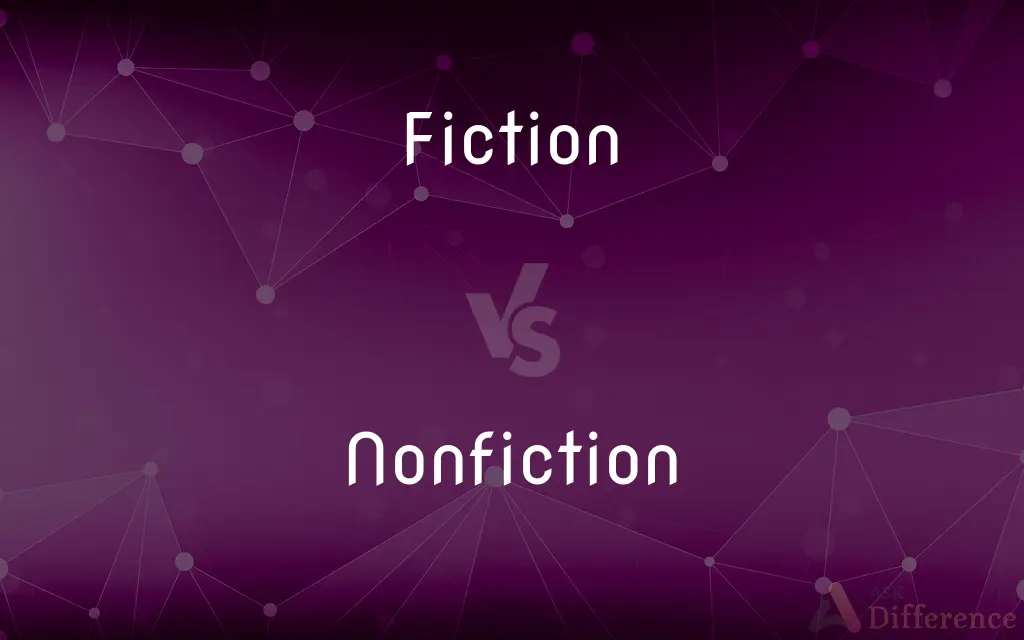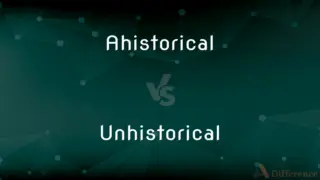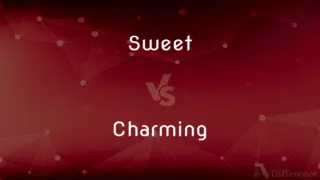Fiction vs. Nonfiction — What's the Difference?
Edited by Tayyaba Rehman — By Fiza Rafique — Updated on November 2, 2023
Fiction is an imaginary or invented stories. Nonfiction is based on facts, real events, and real people.

Difference Between Fiction and Nonfiction
Table of Contents
ADVERTISEMENT
Key Differences
Fiction encompasses literary works created from the imagination, not requiring factual accuracy or reality. Nonfiction, conversely, is based on factual information, real events, and actual people.
Fiction allows for creativity and invention, often including made-up characters, settings, and plots. Nonfiction sticks to factual recounting and explanation, involving real-world facts and data.
The purpose of fiction is often entertainment, exploration of themes, or emotional impact. Nonfiction's goal is to inform, educate, or convey factual content.
In fiction, the narrative structure can be flexible and imaginative. In nonfiction, the structure typically follows a logical, organized, and factual format.
Fiction can include various genres like fantasy, science fiction, or romance. Nonfiction encompasses genres like biography, history, or self-help.
ADVERTISEMENT
Comparison Chart
Basis
Imagination and invention.
Facts, reality, and truth.
Purpose
Entertainment, exploration, impact.
Informing, educating, factual conveyance.
Characters and Plot
Often made up.
Based on real people and events.
Structure
Flexible, imaginative.
Logical, organized, factual.
Genres
Fantasy, romance, sci-fi, etc.
Biography, history, self-help, etc.
Compare with Definitions
Fiction
Invented narrative or plot.
The movie is a work of fiction set in a dystopian future.
Nonfiction
Aimed at conveying information.
Her nonfiction articles cover current global trends.
Fiction
Literary work not based on reality.
He prefers fiction to escape into different worlds.
Nonfiction
Based on factual information.
Her nonfiction book on climate change is very informative.
Fiction
Creatively imagined scenarios.
Science fiction explores concepts beyond current reality.
Nonfiction
Factual and true content.
Nonfiction documentaries educate about real-world issues.
Fiction
Fiction is any creative work (chiefly, any narrative work) consisting of people, events, or places that are imaginary—in other words, not based strictly on history or fact. In its most narrow usage, fiction refers to written narratives in prose and often specifically novels, though also novellas and short stories.
Nonfiction
Real events and people.
He writes nonfiction focusing on historical figures.
Fiction
Literature in the form of prose, especially novels, that describes imaginary events and people.
Nonfiction
Real-life experiences or knowledge.
His memoir is a powerful piece of nonfiction.
Fiction
Something that is invented or untrue
They were supposed to be keeping up the fiction that they were happily married
Nonfiction
The category of literature, drama, film, or other creative work, including essays, expository prose, and documentaries, whose content is based on fact and is not imagined.
Fiction
The category of literature, drama, film, or other creative work whose content is imagined and is not necessarily based on fact.
Nonfiction
Works in this category
I've read her novels but not her nonfiction.
Fiction
Works in this category
The fiction of Virginia Woolf.
Nonfiction
A work in this category
The nonfictions of V.S. Naipaul.
Fiction
A work within this category
The shorter fictions of Faulkner.
Nonfiction
Written works intended to give facts, or true accounts of real things and events. Often used attributively.
Encyclopedias, how-to manuals and biographies are all considered nonfiction and so are kept in the nonfiction section.
Fiction
Narrative, explanatory material, or belief that is not true or has been imagined or fabricated
The notion that he was at the scene of the crime is pure fiction.
Nonfiction
Prose writing that is not fictional
Fiction
A narrative, explanation, or belief that may seem true but is false or fabricated
"Neutrality is a fiction in an unneutral world" (Howard Zinn).
Fiction
(Law) A verbal contrivance that is in some sense inaccurate but that accomplishes a purpose, as in the treatment of husband and wife as one person or a corporation as an entity.
Fiction
(literature) Literary type using invented or imaginative writing, instead of real facts, usually written as prose.
I am a great reader of fiction.
The fiction section of the library
Fiction
A verbal or written account that is not based on actual events (often intended to mislead).
The company’s accounts contained a number of blatant fictions.
The butler’s account of the crime was pure fiction.
Separate the fact from the fiction
Fiction
(legal) A legal fiction.
Fiction
The act of feigning, inventing, or imagining; as, by a mere fiction of the mind.
Fiction
That which is feigned, invented, or imagined; especially, a feigned or invented story, whether oral or written. Hence: A story told in order to deceive; a fabrication; - opposed to fact, or reality.
The fiction of those golden apples kept by a dragon.
When it could no longer be denied that her flight had been voluntary, numerous fictions were invented to account for it.
Fiction
Fictitious literature; comprehensively, all works of imagination; specifically, novels and romances.
The office of fiction as a vehicle of instruction and moral elevation has been recognized by most if not all great educators.
Fiction
An assumption of a possible thing as a fact, irrespective of the question of its truth.
Fiction
Any like assumption made for convenience, as for passing more rapidly over what is not disputed, and arriving at points really at issue.
Fiction
A literary work based on the imagination and not necessarily on fact
Fiction
A deliberately false or improbable account
Fiction
Imagined stories and characters.
Her latest fiction novel is a gripping fantasy.
Fiction
Unreal or fictionalized events.
The book blends fiction with historical events.
Common Curiosities
Can fiction be educational?
Yes, fiction can offer insights or moral lessons, though not factual education.
Is nonfiction always completely factual?
Generally, yes, though it may include some subjective analysis.
Are autobiographies considered nonfiction?
Yes, autobiographies are a type of nonfiction.
Can a book be both fiction and nonfiction?
No, they are distinct categories, but a book can blend elements of both.
Are all novels considered fiction?
Generally, yes, since novels are typically works of imagined narrative.
Do all fiction works have made-up characters?
Mostly, though they may be inspired by real people.
Can fiction contain real events?
Yes, but they are often reimagined or altered for the story.
Can nonfiction be entertaining?
Absolutely, many nonfiction works are engaging and compelling.
Are documentaries considered nonfiction?
Yes, documentaries are a form of visual nonfiction.
Does nonfiction include creative writing?
It can, especially in narrative nonfiction, but it's always based on facts.
Is historical fiction a type of nonfiction?
No, it's fiction, though it incorporates real historical elements.
Can fiction influence real life?
Yes, through themes, ideas, or inspiring change.
Is poetry considered fiction or nonfiction?
It can be either, depending on whether it's based on imagination or reality.
Can memoirs be fictionalized?
While based on real life, some memoirs may include fictionalized elements.
Are textbooks examples of nonfiction?
Yes, textbooks are educational nonfiction.
Share Your Discovery

Previous Comparison
Ahistorical vs. Unhistorical
Next Comparison
Sweet vs. CharmingAuthor Spotlight
Written by
Fiza RafiqueFiza Rafique is a skilled content writer at AskDifference.com, where she meticulously refines and enhances written pieces. Drawing from her vast editorial expertise, Fiza ensures clarity, accuracy, and precision in every article. Passionate about language, she continually seeks to elevate the quality of content for readers worldwide.
Edited by
Tayyaba RehmanTayyaba Rehman is a distinguished writer, currently serving as a primary contributor to askdifference.com. As a researcher in semantics and etymology, Tayyaba's passion for the complexity of languages and their distinctions has found a perfect home on the platform. Tayyaba delves into the intricacies of language, distinguishing between commonly confused words and phrases, thereby providing clarity for readers worldwide.
















































